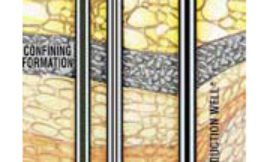In this episode we take another look at the different ways that mineral rights and royalties are taxed and some steps you can take to minimize your tax liability (legally!).
In March each year it is time to think about getting things in order to file your taxes. In this episode we discuss how Mineral rights and royalties are taxed, deductions you can take to reduce the tax liability associated with your oil and gas royalties, and we’ll also provide a refresher on a quick audit you can do on your royalty statements before you file your taxes.
While we’ve talked about some of these topics in the past, this is a comprehensive discussion of taxation on mineral rights and royalties for both new and experienced mineral owners.
So in the famous words of Benjamin Franklin, who wrote in a 1789 letter that “. . .in this world nothing can be said to be certain, except death and taxes.” With that in mind, let’s dive in.
Click here for our FREE IRS Mineral Valuation and Tax Resource Guide.
As a reminder, we are sharing this information for educational purposes only and this should not be construed as tax, legal, or investment advice. Get help from your financial advisor to see if investing in mineral rights, royalties, or non-operated working interests make sense for you.
Be sure to also subscribe on Apple Podcasts via the link above and please leave us an honest rating and review. We read every one of them and sincerely appreciate any feedback you have. To ask us a question to be featured on an upcoming episode, please leave a comment below or send an email to feedback@mineralrightspodcast.com.
Understanding Major Tax Events
Think about taxes in terms of major events that occurred during the course of the previous year. A couple that you need to think about are:
- Did you lease your mineral rights?
- Did you inherit minerals or royalties? This is one that may not incur tax liability in the year that you inherited them but if you decide to sell them in the future then knowing the value at the time of inheritance is needed to determine your tax liability when you sell them.
- Did you sell some or all of your minerals or royalties last year?
So let’s talk about these major events and how they are treated from a tax point of view:
Taxes on Leasing Mineral Rights
- When you sign an oil and gas lease you usually are signing what is called a paid-up lease. That is, you receive an upfront bonus payment to cover the “rental” of your mineral rights during the term of the lease. This lease bonus payment is usually treated as ordinary income and if you were paid more than $600 you will normally receive a 1099 form for this lease bonus from the company that leased your minerals. Even if you don’t get that 1099 form, you still need to report this income on your tax return.
- Ordinary income is defined as any type of income that is taxed at ordinary rates including (but not limited to) salary or wages from a job, bonuses, commission, rent, and royalties. The tax rate that you pay on ordinary income depends on how much income you received and your filing status (e.g. single, married filing jointly). We won’t cover it in detail here but most taxpayers have to look at more than one tax bracket to calculate your effective tax rate. In other words, if your income level falls into the 24% tax bracket, you pay taxes at the lower rates for the income that falls within that bracket and then you have to add these up to determine your effective tax rate.
Taxes on Oil and Gas Royalties
- Oil and Gas Royalties are usually treated as ordinary income and are taxed similar to a lease bonus payment. Again, you should receive a 1099 from the operator (or crude/gas marketer).
- This is what the IRS Oil & Gas Handbook has to say about royalty income:
- “Income from oil and gas royalties is passive-type income derived from the landowner’s royalty, overriding royalty, or a net profits interest. This type of income bears none of the burden of operations or development except taxes and any “post production” costs that state law allows an operator to charge a royalty owner in order to make the production marketable, such as for gas compression. Royalty income may be paid by the operator of the property or by the purchaser of the crude oil or gas production. In either event, the royalty owner should receive a statement with the check (usually monthly but at least periodically) showing the total sales of oil and gas from the property, interest in the property, and the amount of production. The taxpayer will normally report royalty income on Schedule E as rents and royalties or from flow through entities. The taxpayer can have both royalty and working interest income and report both on a Schedule C.”
Again, get with your CPA for specifics on how to handle this or better yet make sure your CPA is familiar with oil and gas taxes and have them take care of it.
Tax season is a good time to do a quick and easy royalty audit to make sure that your 1099’s are correct before you file your taxes. We walk through step-by-step on how to do this in MRP 97: How to Audit Your Oil and Gas Royalty Statements.
The reason for this is your oil and gas operator can make a mistake and report the wrong amount on your 1099 so you want to double check that amount against your check stubs to ensure it is correct. It doesn’t take much time to do and it can prevent headaches down the road.
The Depletion Deduction and other Expenses
Another important thing to think about with royalties is the Depletion Deduction.
What is it? The depletion deduction is similar to the ability to depreciate the cost of a capital investment over its useable life that most businesses or investments like a residential real estate investment property get to enjoy. Depreciation is the mechanism for recovering your cost in an income-producing property. This is an important one that many royalty owners don’t know about and if you don’t take advantage of this you end up overpaying on your taxes which nobody wants to do.
This is what the IRS says about the depletion deduction:
- “An oil and/or gas producing property is a “wasting” asset. The quantity of oil and/or gas found in any natural deposit is finite. As the oil and/or gas is produced and removed from the deposit, the deposit is depleted. The owner of an economic interest in an oil and/or gas producing property may be entitled to a deduction from income for depletion of such economic interest as the oil and/or gas is produced and sold. Mineral interests, royalties, working interests, overriding royalties, net profits interests, and production payments are all economic interests in mineral deposits.
- Once a mineral property becomes productive, the owner or owners of economic interests in that property must recover their cost basis through the depletion deduction”
It is important to note that since the deduction is only allowed once oil and gas is actually sold, so it is not applicable against lease bonus payments.
In the case of oil and gas wells a “reasonable allowance” for depletion is an allowable deduction in computing taxable income.
The Internal Revenue Code provides two specific methods of computing the depletion deduction which we won’t go into detail here because we covered this in detail in MRP 105: What You Should Know About the Depletion Deduction
It is worth mentioning that most royalty owners will use the percentage depletion deduction. As a side note this is an amazing tax benefit available to mineral and royalty owners and investors. Percentage depletion is generally calculated by multiplying your gross income from oil and gas royalties by 15%. In other words, you get to deduct 15% from your current royalty income with this provision in the IRS tax code. Of course, if it were that easy the tax code would only be a few pages long and there some limitations on how much you can deduct based on the percentage of taxable income that the deduction represents, if the average daily production exceeds a certain amount, or if the property saw a loss for that tax year (in other words you had a net loss from the property).
Inheritance of Mineral Rights and Royalties
I have had several listeners come to me after they have sold their mineral rights and ask how to determine the cost basis for their minerals. I won’t say that it is “too late” but it becomes more difficult & costly to accurately determine the cost basis several years after you inherit the property.
Most of the time you don’t have to pay taxes on inherited minerals and royalties until you sell them. There was some noise last year about the possibility of charging tax on unrealized capital gains associated with the inheritance of property but thankfully that was taken out of proposed legislation.
A possible exception to this are estate taxes. If you are lucky enough (or unlucky depending on how you look at it) to have to think about estate taxes because you are inheriting an estate with a value near the amount that would trigger an estate tax return ($11,700,000 in 2021), then your situation may be different In any case, if you inherit mineral rights or royalties, consult with your CPA and attorney to determine what to do.
One thing to think about when you inherit mineral rights or royalties is to minimize your tax liability down the road should you decide to sell which brings us to the next topic:.
Sale of Mineral Rights
Generally if the property has been owned for more than a year, the sale will be taxed as “long-term capital gains”
Similar to owning stock, you would take the sales price minus the cost basis to determine your tax liability. What that means is you only have to pay taxes on the profit from that sale.
For a mineral rights sale, the capital gain would be determined based on the proceeds from the sale minus the basis assigned to the mineral rights when you purchased the land or inherited the minerals. If the value was “0”, then the entire sales proceeds would be taxed as capital gains income.
One way to minimize your tax liability is to take a “step up in cost basis” by obtaining a professional appraisal of the property to determine what it was worth at the time of death. If you inherited property in the past 10 years and it is of substantial size then it might be worth obtaining an appraisal in order to reduce your tax liability. For many small properties, you may not save more in taxes than you would spend on the appraisal but a reputable consultant will be able to determine what the cutoff point is for your property.
The moral of the story if you are thinking about selling your minerals or royalties is to hold on to them for at least a year if you can so that you only have to pay the long-term capital gains tax rate which is usually lower for most people than having to pay tax at your ordinary income tax rate which is what you could have to do if you hold it for less than a year and the sale is taxed as short-term capital gains.
I have spoken to many mineral owners who don’t want to have to deal with managing their royalty interests and that is one of the reasons they decide to sell. Another option if you don’t need the cash now is to defer capital gains taxes on the sale through what is called a 1031 exchange.
The 1031 refers to the section of the IRS code that covers this but in general it covers using the proceeds from the sale of one property to purchase other similar property (other mineral rights or real estate). This is called a “like kind exchange.” Because mineral rights and royalties are considered a form of real property, an example would be to reinvest that money into an investment property like a residential rental property.
Because of the complexity and timing requirements associated with performing a 1031 exchange, it is critical that you seek the advice of a competent tax advisor to make sure you follow all the steps correctly.
I hope you found this tax guide helpful and that it will arm you with questions to ask your CPA come tax time.
Resources Mentioned in this Episode
FREE DOWNLOADS:
- Download my free royalty audit worksheet to help you get started. This free Worksheet has a template to help you perform a quick end of year royalty audit against your 1099’s to make sure they are correct before you file your taxes.
- Click here for our FREE IRS Mineral Valuation and Tax Resource Guide.
OTHER HELPFUL STUFF:
- MRP 20: Taxes on Mineral Rights and Royalties
- MRP 97: How to Audit Your Oil and Gas Royalty Statements
- MRP 105: What You Should Know About the Depletion Deduction
- MRP 54: Using a 1031 Exchange to Defer Capital Gains Tax
- MRP 118: Guide to Proposed Tax Law Changes for Mineral and Royalty Owners
- MRP 32: Rob Prentice on IRS Mineral Rights Valuation and the National Association of Royalty Owners
Thanks for Listening!
To share your thoughts:
- Leave a comment or question below (we read each one and your question may be featured in a future episode)!
- Ask a question or leave us feedback via email.
To help out the show:
Click the Apple Podcasts Logo Above to leave us a rating & review. It really helps us reach those that need to hear this information and only takes a minute. We greatly appreciate it! Plus, you can get a shout out on a future episode!
Thanks again – until next time!




